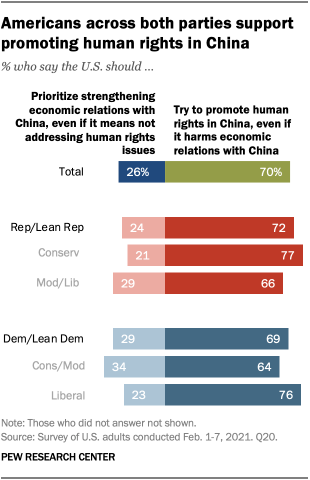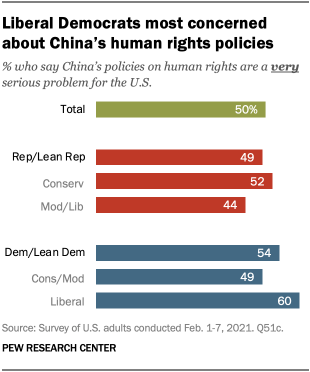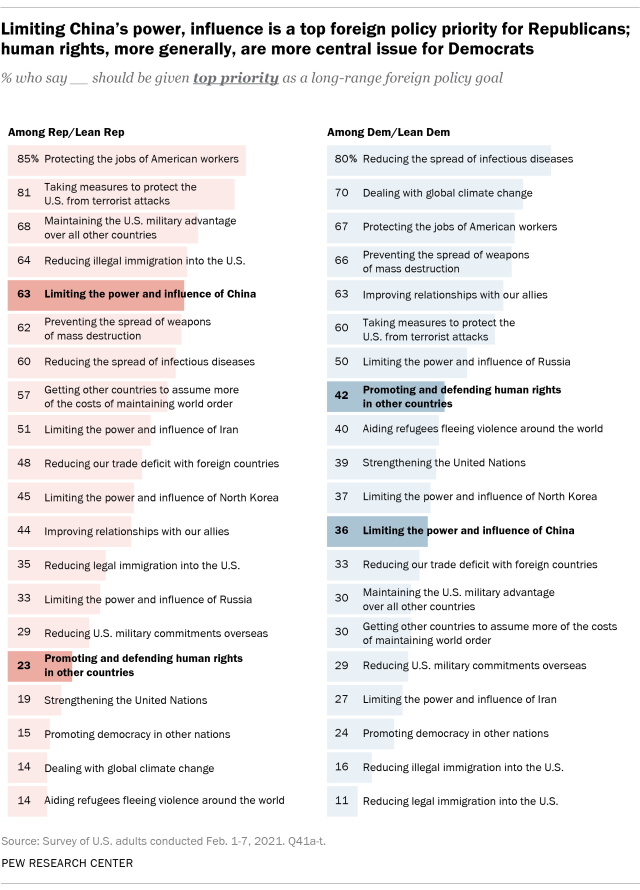A large majority of Americans – Republican and Democrat alike – say the U.S. should try to promote human rights in China, even if it harms economic relations between the two countries, according to a February Pew Research Center survey.
Seven-in-ten U.S. adults hold this view compared with just 26% who think the U.S. should prioritize strengthening economic relations with China, even if it means not addressing human rights.
The finding comes at a time when President Joe Biden has chosen to put human rights in the foreground in his dealings with China. In his first phone call with Chinese President Xi Jinping in February, he expressed “fundamental concerns” about that country’s crackdown in Hong Kong and human rights abuses against its Uyghur population.
This analysis draws on a survey of 2,596 U.S. adults conducted Feb. 1-7, 2021. Everyone who took part in this survey is a member of Pew Research Center’s American Trends Panel (ATP), an online survey panel that is recruited through national, random sampling of residential addresses. This way nearly all U.S. adults have a chance of selection. The survey is weighted to be representative of the U.S. adult population by gender, race, ethnicity, partisan affiliation, education and other categories. Read more about the ATP’s methodology.
The analysis also draws on an open-ended question in which Americans were asked to describe, in their own words, the first things that come to mind when they think about China. Researchers coded the first five mentions in each of 2,010 open-ended responses using a researcher-developed codebook.
Here are the questions used for this report, along with responses, and its methodology.
Unlike with other China-related issues, there is little partisan difference on this question: 72% of Republicans and independents who lean toward the Republican Party are in favor of emphasizing human rights, as are 69% of Democrats and Democratic leaners. It is also one of the few issues on which conservative Republicans and liberal Democrats agree. Around three-quarters of each group think the U.S. should promote human rights.
A broad majority (84%) of Americans believe China’s human rights policies are a problem for the United States – including 50% who think they are a very serious problem. The share calling the issue a very serious problem is also up 7 percentage points since last March – and has risen among Republicans and Democrats. In fact, Republicans and Democrats are about equally likely to describe China’s human rights policies as a very serious problem for the U.S., though liberal Democrats are particularly apt to describe it that way compared with conservative and moderate Democrats, moderate and liberal Republicans and conservative Republicans.
Around three-quarters of Americans (76%) also think tensions between mainland China and Hong Kong are a problem for the U.S., though only 31% call it a very serious problem. Conservative Republicans (38%) are particularly apt to call this issue a very serious problem relative to moderate and liberal Republicans, conservative and moderate Democrats, and liberal Democrats (29% of whom say the same, respectively).
In an open-ended question that asked people to describe the first things that come to mind when they think of China, one-in-five Americans mentioned human rights, including 3% who specifically mentioned the Xinjiang region and the Uyghurs who live there, genocide or concentration camps. Democrats and Republicans were also equally likely to mention human rights in their answers. Those who follow the news regularly were more likely to mention human rights in their responses than those who follow it less often.
However, outside of the context of China, there is limited consensus about the relative importance of promoting and defending human rights in other countries. Only around a third of Americans (34%) believe a focus on human rights should be a top U.S. foreign policy goal, and the issue ranks 15th in a list of 20 issues tested – significantly below the 48% who say limiting the power and influence of China should be a top foreign policy priority. Partisan differences are also more pronounced when it comes to the overall importance of promoting human rights as a broad policy priority than when it comes to China in particular. Democrats and Democratic-leaning independents are around twice as likely to describe defending human rights in other countries as a top priority (42%) as Republicans and Republican-leaning independents (23%).
Note: Here are the questions used for this report, along with responses, and its methodology.



